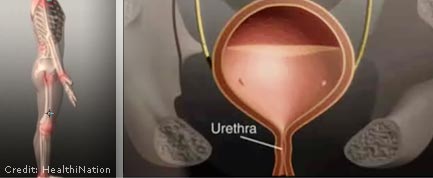How to Solve Bladder Control Problems

This Week's Question: This is embarrassing to discuss with anyone so I thought I'd write to you about it. I'm having bladder-control problems. What can I do?
About 10 percent of men and women over the age of 65 have trouble with bladder control, also know officially as urinary incontinence. Women suffer from this more than men.
During urination, muscles in the bladder contract, forcing urine into the urethra, a tube that carries urine out of the body. At the same time, muscles surrounding the urethra relax and let the urine pass. If the bladder muscles contract or the muscles surrounding the urethra relax without warning, the result is incontinence.
Short-term incontinence is caused by infections, constipation, and some medicines. If the problem persists, it might be caused by weak bladder muscles, overactive bladder muscles, blockage from an enlarged prostate, damage to nerves that control the bladder from diseases such as multiple sclerosis or Parkinson's.
Treatable condition
In most cases urinary incontinence can be treated and controlled, if not cured. If you are having bladder control problems, go to your doctor. Doctors see this problem all the time, so there is no need to be embarrassed.
Your doctor may do a number of tests on your urine, blood and bladder. You may be asked to keep a daily chart about your urination.
Get the world’s most fascinating discoveries delivered straight to your inbox.
There are several different types of urinary incontinence:
- If urine leaks when you sneeze, cough, laugh or put pressure on the bladder in other ways, you have "stress incontinence."
- When you can't hold urine, you have "urge incontinence."
- When small amounts of urine leak from a bladder that is always full, you have "overflow incontinence."
- Many older people who have normal bladder control but have difficulty getting to the bathroom in time, have "functional incontinence."
There are many ways to treat urinary incontinence. The method depends upon the type of problem.
You can train your bladder with exercises and biofeedback. You can also chart your urination and then empty your bladder before you might leak.
Plugs, medicines and surgery
Your doctor has other tools he can use. There are urethral plugs and vaginal inserts for women with stress incontinence. There are medicines that relax muscles, helping the bladder to empty more fully during urination. Others tighten muscles in the bladder and urethra to cut down leakage.
Surgery can improve or cure incontinence if it is caused by a problem such as a change in the position of the bladder or blockage due to an enlarged prostate. Common surgery for stress incontinence involves pulling the bladder up and securing it. When stress incontinence is serious, the surgeon may use a wide sling. This holds up the bladder and narrows the urethra to prevent leakage.
Even if treatment is not fully successful, management of incontinence can help you feel more relaxed and comfortable about the problem.
- The Top 10 Worst Hereditary Conditions
- Strange New Source of Bladder Pain Discovered
- 5 Painful Facts You Need to Know
The Healthy Geezer column publishes each Wednesday on LiveScience. If you would like to ask a question, please write fred@healthygeezer.com. © 2009 by Fred Cicetti.


